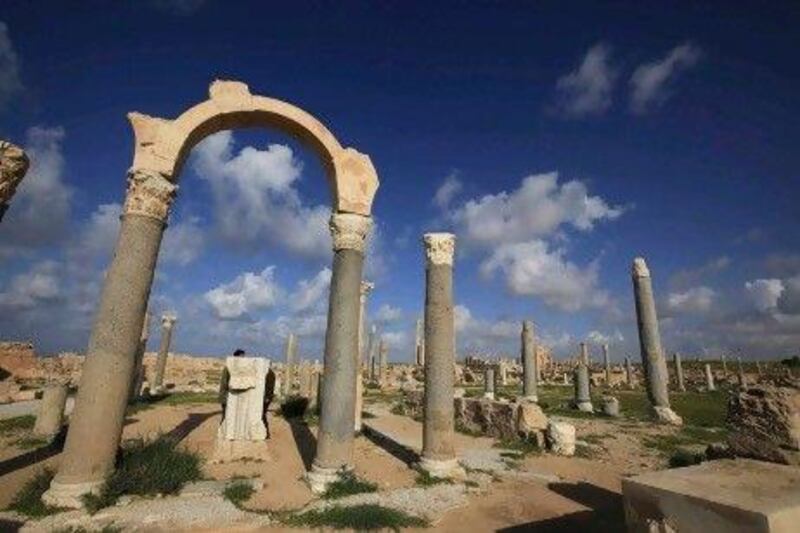The shimmering Mediterranean waters gently lap the shore of a pristine, seemingly endless stretch of beach.
Nearby, majestic Roman ruins stand as testament to the country's rich heritage.
But this is not Italy. It is Libya. The war-torn country has long been off the radar for holidaymakers. Yet it has the potential to emerge as a major tourism destination after the fall of Colonel Muammar Qaddafi.
Already, some of the leading global hotel chains are considering moving into the country once the political and military upheaval subsides.
"We believe it will take time, but Millennium & Copthorne can see a good market for all our brands," says Michael Marshall, the vice president of sales and marketing at Millennium & Copthorne Hotels Middle East.
Under the repressive regime of Col Qaddafi, tourism made up just 1 per cent of Libya's economy, with the country attracting fewer than 150,000 visitors a year.
But all that could change, because the North African nation has the financial muscle, through oil revenue, to compete with nearby tourism destinations.
Neighbouring Tunisia attracts 7 million tourists a year, and the industry accounts for 7 per cent of the country's economy, generating US$3 billion (Dh11.01bn) of revenue a year.
"We believe both Tunisia and Libya have great untapped tourism potential, and as the political environment settles down, we will certainly be looking to see what opportunities there are to enter these markets," says Rudi Jagersbacher, Hilton Worldwide's president in the Middle East and Africa.
But there is still a great deal of work to be done to turn Libya into a major tourism haven. The nine-month conflict has wiped out what was left of the industry as international airlines and tour operators scrapped services.
"When better days do come, it is likely that more players will be targeting the country's travel accommodation market," says Nadejda Popova, a travel and tourism analyst at Euromonitor International.
Other industry experts echo her view.
"The expectation that we have is that with a new political environment in Libya, the authorities will be looking more favourably to tourism as a source of diversification of the economy away from oil and a source of employment creation," says Amr Abdel-Ghaffar, the UN World Tourism Organization's regional director for the Middle East. "Both in terms of culture and environment, and also in terms of beach tourism, it has a tremendous development potential, which has not been exploited so far."
Libya has almost 2,000km of Mediterranean coastline as well as the ancient ruins of Leptis Magna, a spectacular example of Roman architecture and now a Unesco World Heritage site.
Just along the coast are the Greek ruins of Cyrene,dating to 630 BC and considered by historians to reflect the golden age of Hellenic culture.
"There's big potential," says Deepak Jain, the head of strategic consulting, Middle East and North Africa, at the property services company Jones Lang LaSalle. "In tourism terms, it's a very nice Mediterranean location. It's just across the pond from Europe, so there are a number of opportunities, such as secondary homes."
But before that can happen, developers will need to build major resorts in the country. Omer Kaddouri, the chief operating officer at Abu Dhabi's Rotana, revealed that the group still aims to open a hotel in Libya after putting plans on hold because of the conflict.
"The country has tremendous potential for the development of its infrastructure and facilities," he says.
Libya certainly has the right mix of sun, sea and stunning settings to attract visitors from Europe and the Middle East.
"Aside from its archaeological marvels, Libya is also home to mountains, national parks and protected nature reserves, and presents interesting opportunities for adventure travellers and the development of ecotourism," says Ms Popova.
"There is, therefore, a large untapped market to consider for the growth of travel and tourism in the future - one which could be looked at more closely by any new government," she says. "But there will be a great deal of work required to revive the travel and tourism industry. A key priority for a new government - post-[Col] Qaddafi - will be to establish an influential tourism authority, and to develop a long-term strategy."
In the meantime, Libya's travel sector is expected to struggle for at least another two years.
"There is a great deal of reconstruction needed," says Ms Popova. "How visa procedures evolve will also be essential to assess the country's tourism potential."
Building the infrastructure to attract tourists will also be vital as there are just a few upmarket hotels in Tripoli, which mainly cater to business travellers.
In recent years, brands such as JW Marriott, Radisson Blu and Four Points by Sheraton, have opened hotels in the Libyan capital.
But they were closed as civil war gripped the country. It is still unclear when JW Marriott will reopen its hotel.
"There are still a number of UN sanctions in place, and the security situation is not clear," says Jeff Strachan, the vice president of sales and marketing, Middle East and Africa, for Marriott International. "There is a long way to go before we look that far ahead. Leisure tourism requires a significant infrastructure and a good level of safety and security."





